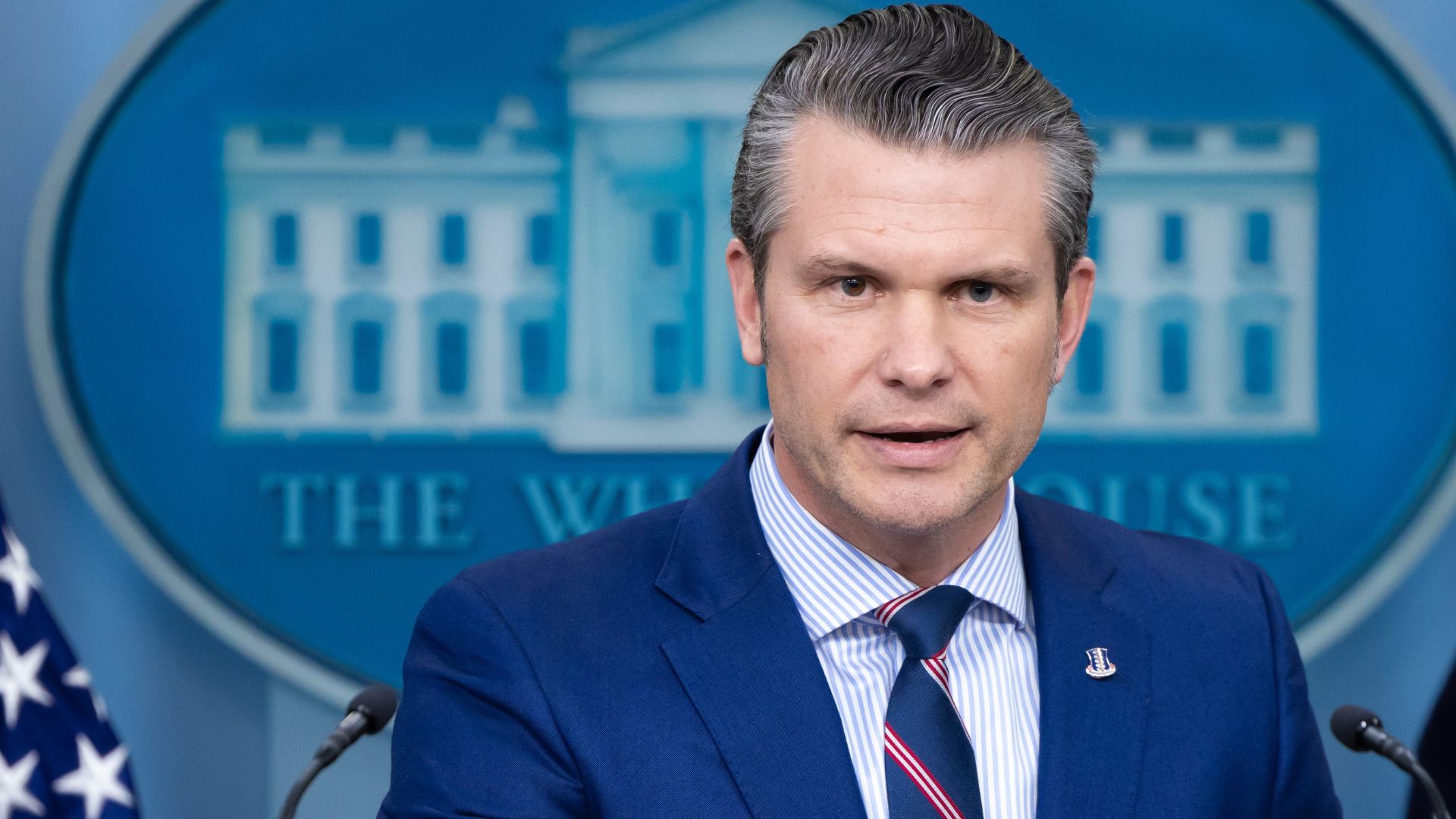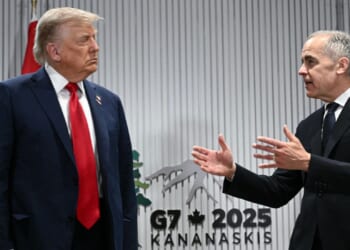
President Donald Trump issued a warning Wednesday after the Department of Defense, led by Defense Secretary Pete Hegseth, authorized the voluntary departure of military family members from several U.S. bases in the Middle East.
The decision comes amid rising tensions with Iran and uncertainty surrounding nuclear negotiations.
The Pentagon confirmed that military dependents are being offered the option to leave U.S. bases in Iraq, Syria, Qatar, and the United Arab Emirates.
Trump’s Sovereign Wealth Fund: What Could It Mean For Your Money?
The move primarily impacts families stationed in Bahrain, home to a major U.S. Navy base, according to Fox News.
Asked about the reasoning behind the evacuation order, President Trump told reporters, “You’ll have to see.”
He later added, “They are being moved out because it could be a dangerous place.”
When asked about what could ease the growing tensions, Trump responded, “They can’t have a nuclear weapon, very simply. They can’t have a nuclear weapon. We’re not going to allow that.”
REPORTER: “Could you provide an update on Iran? US personnel are being moved out of the region.”
TRUMP: “They are being moved out because it could be a dangerous place. We’ll see what happens.”
“They can’t have a nuclear weapon, very simple.” pic.twitter.com/yGZ0Kal7bi
— Breaking911 (@Breaking911) June 11, 2025
This Could Be the Most Important Video Gun Owners Watch All Year
Following his remarks, Trump attended a scheduled event at the Kennedy Center.
In coordination with the Pentagon, the State Department also authorized the departure of nonessential personnel from the U.S. Embassy in Baghdad, citing the need to safeguard American personnel amid the deteriorating security landscape.
“President Trump is committed to keeping Americans safe, both at home and abroad,” a State Department official told The Hill.
“Based on our latest analysis, we decided to reduce the footprint of our Mission in Iraq.”
The embassy in Baghdad has operated under limited staffing for several years due to previous security threats, including rocket and mortar attacks during periods of heightened conflict between the U.S. and Iran.
On Wednesday, the State Department expanded its directive to include voluntary departures of staff and families from diplomatic posts in Bahrain and Kuwait.
“The safety and security of our service members and their families remains our highest priority,” the Defense Department said in a statement.
“U.S. Central Command is monitoring the developing tension in the Middle East.”
According to two defense officials who spoke with Fox News, no uniformed U.S. military personnel are currently being evacuated.
The directive only applies to civilian dependents and nonessential embassy staff.
The drawdown of personnel follows a stall in negotiations between the U.S. and Iran aimed at curbing Iran’s nuclear ambitions in exchange for limited sanctions relief.
Talks have been ongoing since April but have yet to yield an agreement.
Iranian officials are expected to present a counterproposal this weekend after labeling the current U.S. offer as vague and insufficient.
Iranian parliament leaders claim the latest U.S. proposal fails to address the lifting of sanctions—Tehran’s central demand.
President Trump expressed doubt about the likelihood of reaching a deal in an interview released Wednesday with the New York Post’s Pod Force One podcast.
“I’m less confident now than I would have been a couple of months ago. Something happened to them,” Trump said.
“They seem to be delaying, and I think that’s a shame.”
Iranian Defense Minister Amir Aziz Nasirzadeh issued a warning Wednesday, stating that Iran is prepared to respond if negotiations break down.
“If conflict is imposed on us, the opponent’s casualties will certainly be more than ours,” Nasirzadeh told reporters.
“America must leave the region, because all its bases are within our reach. We have access to them, and we will target all of them in the host countries without hesitation.”
Despite Iran’s repeated statements that its nuclear program is for peaceful purposes, international scrutiny has intensified.
In a statement posted to social media, Iran’s mission to the United Nations said, “Iran is not seeking a nuclear weapon, and U.S. militarism only fuels instability. Diplomacy—not militarism—is the only path forward.”
Meanwhile, the International Atomic Energy Agency (IAEA) may take action against Tehran.
On Tuesday, IAEA Director-General Rafael Grossi stated that Iran’s stockpile of highly enriched uranium and unresolved safeguards issues are of serious concern.
“Unless and until Iran assists the agency in resolving the outstanding safeguards issues, the Agency will not be in a position to provide assurance that Iran’s nuclear program is exclusively peaceful,” Grossi said.
In late May, the IAEA released a report indicating that Iran had engaged in undeclared nuclear activities at three sites under investigation.
A formal censure by the IAEA could trigger the reimposition of U.N. sanctions under the 2015 nuclear deal’s dispute resolution mechanism—an agreement the Trump administration withdrew from during his first term.
Connect with Vetted Off-Duty Cops to Instantly Fulfill Your Security Needs

![Trump Issues Ominous Warning as Hegseth Makes Major Middle East Move [WATCH]](https://www.right2024.com/wp-content/uploads/2025/06/Trump-Issues-Ominous-Warning-as-Hegseth-Makes-Major-Middle-East-750x375.jpg)

![Former Bravo Star Charged After Violent Assault Using a Rock-Filled Sock in Tennessee Walmart [WATCH]](https://www.right2024.com/wp-content/uploads/2025/07/Former-Bravo-Star-Charged-After-Violent-Assault-Using-a-Rock-Filled-350x250.jpg)



![Karoline Leavitt Levels CNN's Kaitlan Collins and Other Legacy Media Reporters [WATCH]](https://www.right2024.com/wp-content/uploads/2025/07/Karoline-Leavitt-Levels-CNNs-Kaitlan-Collins-and-Other-Legacy-Media-350x250.jpg)
![Man Arrested After Screaming at Senators During Big Beautiful Bill Debate [WATCH]](https://www.right2024.com/wp-content/uploads/2025/06/Man-Arrested-After-Screaming-at-Senators-During-Big-Beautiful-Bill-350x250.jpg)

![Illegal Alien Walked Free After Decapitating Woman, Abusing Corpse for Weeks [WATCH]](https://www.right2024.com/wp-content/uploads/2025/07/1753013138_Illegal-Alien-Walked-Free-After-Decapitating-Woman-Abusing-Corpse-for-350x250.jpg)






